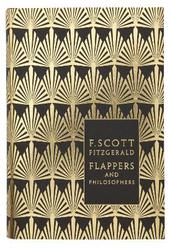
|
Flappers and Philosophers: The Collected Short Stories of F. Scott Fitzgerald
Hardback
Main Details
| Title |
Flappers and Philosophers: The Collected Short Stories of F. Scott Fitzgerald
|
| Authors and Contributors |
By (author) F. Scott Fitzgerald
|
| Series | Penguin F Scott Fitzgerald Hardback Collection |
|---|
| Physical Properties |
| Format:Hardback | | Pages:672 | | Dimensions(mm): Height 204,Width 138 |
|
| Category/Genre | Classic fiction (pre c 1945)
Short stories |
|---|
| ISBN/Barcode |
9780141194103
|
| Classifications | Dewey:813.52 |
|---|
| Audience | |
|---|
|
Publishing Details |
| Publisher |
Penguin Books Ltd
|
| Imprint |
Penguin Classics
|
| Publication Date |
4 November 2010 |
| Publication Country |
United Kingdom
|
Description
These sumptuous new hardback editions mark the 70th anniversary of Fitzgerald's death. Encompassing the very best of F. Scott Fitzgerald's short fiction, this collection spans his career, from the early stories of the glittering Jazz Age, through the lost hopes of the thirties, to the last, twilight decade of his life. It brings together his most famous stories, including 'The Diamond as Big as the Ritz', a fairy tale of unlimited wealth; the sad and hilarious stories of Hollywood hack Pat Hobby; and 'The Lost Decade', written in Fitzgerald's last years.
Author Biography
F. Scott Fitzgerald was born in 1896 in St Paul, Minnesota, and went to Princeton University, which he left in 1917 to join the army. He was said to have epitomized the Jazz Age, which he himself defined as 'a generation grown up to find all Gods dead, all wars fought, all faiths in man shaken'. In 1920 he married Zelda Sayre. Their traumatic marriage and her subsequent breakdowns became the leading influence on his writing. Among his publications were five novels, This Side of Paradise, The Great Gatsby, The Beautiful and the Damned, Tender is the Night and The Last Tycoon (his last and unfinished work); six volumes of short stories and The Crack Up, a selection of autobiographical pieces. Fitzgerald died suddenly in 1940. After his death The New York Times said of him that 'He was better than he knew, for in fact and in the literary sense he invented a 'generation'. . . he might have interpreted and even guided them, as in their midle years they saw a different and nobler freedom threatened with destruction.'
|